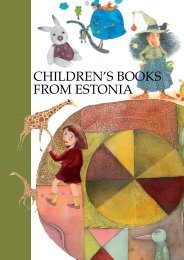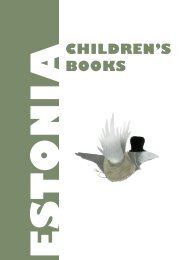No 4 Autumn 2012 - Estonian Literature
No 4 Autumn 2012 - Estonian Literature
No 4 Autumn 2012 - Estonian Literature
Create successful ePaper yourself
Turn your PDF publications into a flip-book with our unique Google optimized e-Paper software.
Urmas Vadi<br />
leTTers To aunT anne Urmas Vadi<br />
Urmas Vadi’s first novel, Letters to Aunt Anne (Kirjad tädi Annele, 2010) is<br />
an epistolary book in form. It is a curious work about writing a novel and being<br />
a writer in itself.<br />
The story goes as follows: a young writer, a narrator bearing the same name<br />
as the author of the book, writes to “Aunt Anne” for the first time in May<br />
2008, promising to dedicate himself to writing. He is finally going to fulfil<br />
the expectations of his profession instead of wasting time on different things<br />
he has been doing up to then: writing the plays, film scripts, and texts that he<br />
is asked to write. The novel consists of eleven letters from over the period of<br />
about one year, and seven different excerpts sent to Aunt Anne.<br />
The author of the letters is a fantastic storyteller, and the correspondence<br />
itself often transforms into actual tales.<br />
The novel seems to already have a title: The Anatomy of Foxes. Seemingly<br />
beginning as a metatext about writing a novel, the letters even contain the first<br />
two chapters of the book to describe the writing process. However, the author<br />
has an immediate surprise in store:<br />
instead of continuing, he conveys to Aunt<br />
Anne different pieces that he has written<br />
for several reasons.<br />
The stories he includes are bizarre:<br />
they are surprising and deeply humorous,<br />
frightening, sad, very realistic, and<br />
abruptly entirely surreal. Things from<br />
everyday life are mixed with absurd<br />
fantasy and black humour in a dreamlike<br />
and yet familiar world with local <strong>Estonian</strong><br />
place names – the living and the dead<br />
meet with self-evident ease.<br />
Still, every text delves deep into the<br />
experience of being a writer. The Death<br />
of Tartu goes into the very young man’s<br />
days beginning his career and meeting<br />
the writer E (the prototype is the wellknown<br />
<strong>Estonian</strong> writer Jüri Ehlvest), and<br />
confronting him to become a writer himself. Here, meeting personalized Death<br />
in Tartu’s marketplace seems to be the most logical thing in the world.<br />
Of the two other longer stories, Revident (Inspector) is a sort of thriller,<br />
in which the writer goes to live for a few days in a village of Russian Orthodox<br />
Old-Believers and write a story there. He becomes entangled in an old legend<br />
told in the village, and meets the Devil. Toonesepad (Death Watch Beetles)<br />
describes an old wooden house, in which the writer lives together with his<br />
cousins. The issue of fame arises in the story: as selling the apartment of a<br />
dead writer seems to be easier, he has to fake his death.<br />
Although the segments resemble fragments in a way, they still make up<br />
a whole. The novel ends with a poem written to the writer’s son, humorously<br />
and yet seriously summing up the fears he has: most of all, the fear that his<br />
son will become a writer, too.<br />
Text by Elle-Mari Talivee<br />
10 Books from Estonia<br />
urmas vadi (b. 1977) graduated in radio directing<br />
from Tallinn University. He has worked as a radio<br />
journalist, and is a playwright and producer.<br />
Vadi was the youngest author to win the New Drama<br />
Competition with the children’s play, Varasta veel<br />
võõraid karusid (That’s What You Get for Stealing<br />
My Bears!, 1999). Since then, his plays have been<br />
constantly on stage and repeatedly awarded;<br />
such as with the Annual Award of the <strong>Estonian</strong><br />
Cultural Endowment in 2010. Vadi has written film<br />
scripts and short stories (winning the prestigious<br />
Friedebert Tuglas Short Story Award in 2011).<br />
Publishing deTails<br />
Kirjad tädi Annele<br />
Jumalikud Ilmutused, 2010, pp. 239<br />
Rights’ contact: Ilvi Liive at estlit@estlit.ee<br />
awards<br />
Wordwormer Prize 2011<br />
<strong>No</strong> 4 <strong>Autumn</strong> <strong>2012</strong><br />
7







